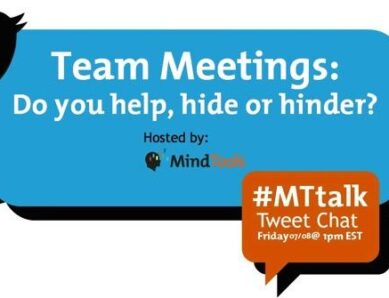Maybe you’re the exception to the rule and you absolutely love meetings, but many of us don’t enjoy them. Some meetings drag on for hours, without adding much value. Other meetings are held for no better reason than that it’s the usual routine to have them.
Regardless of how we feel about them, we all have to attend meetings from time to time. While we may feel they’re a necessary evil, meetings in and of themselves are neutral: it’s the behavior of the attendees that make meetings painful or productive.
Some people find it difficult to speak up in meetings for fear of being “wrong,” because they don’t want to deal with conflict, or because they worry about their ideas being rejected. Others want to talk all the time, taking over the meeting and repeating points unnecessarily. And then there are the “shining lights”, the people who help others to express their ideas, who come prepared and keep meetings productive.
During our #MTtalk Twitter chat, held on Friday (July 8), we asked participants whether they help, hide or hinder during team meetings.
Questions about contributing in team meetings
Here are the ten questions we asked during the chat, along with some of the responses we received.
Question 1: What unproductive meeting behavior do you most often witness?
@JulieMRodriguez: “People being unengaged, showing up late, and looking at their phones, meaning that things to have to be repeated.”
@amypen64: “Snide comments, looks and nonverbals from coworkers who don’t want to be in the meeting or who make fun of others.”
Question 2: Has anyone ever tried to take over your team meeting and, if so, how did you deal with it?
@prince_ally1: “I met with the person before the meeting to agree lines to take on subjects and to agree who would answer questions.”
@ShereesePubHlth: “I did once, from a male colleague who was famous for demeaning females. I put him in his place on behalf of everybody in the room.”
Question 3: How can you rescue a meeting that seems long, unfocused or unproductive?
@jprofNB: “Stop, refocus and come back to meeting objectives, and restart.”
@WonderPix: “Change it up… get everybody to stand up, introduce some humor or something unexpected to inject energy and redirect people’s focus.”
Sometimes it’s necessary to help other people to find their voice. We wanted to know how our participants would go about doing so.
Question 4: How can you encourage the quieter members at the meeting to speak up?
@JulieMRodriguez: “Before the meeting, ask shy people to prepare to bring up a point. Eventually, doing so will become a habit.”
@Midgie_MT: “To get the quieter ones involved, I ask them directly for their input or their thoughts on the discussion. Seek everyone’s thoughts.”
Question 5: How can you make sure that your ideas are heard?
@EliseID8: “Relationship is key, and it starts outside the meeting. Be relevant, prepared and reliable. Follow through afterwards, so that you’re seen as being trustworthy.”
@SayItForwardNow: “Speak concisely to make your points. If no-one engages, restate your ideas again to be certain that they’re heard and understood.”
Question 6: What preparations can you make beforehand to ensure the meeting’s success?
@ZalkaB: “Take a strong lead. Make sure that the agenda is clear, that it is followed, and that everyone can contribute. Manage those who wish to overtalk.”
@ChayneDaisy: “Request pre-meeting activity to get people thinking and focused on achieving a positive output.”
Question 7: When is holding a meeting a bad idea?
Many participants agreed that meetings should be avoided if an email or a one-on-one meeting will suffice. Other responses included:
@amypen64 “When you’re having a meeting about a meeting! Do you really need to meet?”
@Singh_Vandana: “When there’s no clear purpose or agenda. When not all attendees are required.”
Question 8: What would you do if someone was critical or negative towards other people’s ideas?
@ShereesePubHlth: “Remind negative team members that everyone has something to contribute and to respect people’s differences.”
@MicheleDD_MT: “Find a way to reframe to depersonalize things. Focus on the ‘what’ rather than the critique of the person.”
Question 9: How can you set up your meetings to reduce the risk of conflict?
@sistadahealer: “Set ground rules for the meeting, and establish what will happen if someone fails to adhere to them.”
@harrisonia: “Make everyone accountable by checking their tone, choosing their words carefully, and thinking before speaking.”
Question 10: What people skills can help you to run meetings more effectively?
@Dwyka_Consult: “Treat all participants with equal respect. Listen with attention. Don’t make snap judgments or jump to conclusions.”
@ankitapoddar: “Great questions make for great discussions. Know which ones to ask.”
Next time, on #MTtalk…
We live in a brave new world of communicating via electronic devices, being on social media, and staying connected almost 24/7. But in this connectivity frenzy, we sometimes wonder what happened to good manners.
During our next #MTtalk on Friday, July 22, 2016, the chat topic is, “Netiquette: Minding Your Cyberspace Manners.” As always, it will take place at 1 p.m. EST (5 p.m. GMT). We’ll be glad if you can join us on Twitter to share your thoughts and ideas.
To join the chat, type #MTtalk in the Twitter search function. Then, click on “All Tweets” and you’ll be able to follow the live chat feed. To participate, simply include #MTtalk in your tweet and it will show up in the chat feed.
Resources
In the meantime, if you’d like to learn more about holding good meetings, here are some useful resources:
- How to Get Your Voice Heard in Meetings
- Managing Conflict in Meetings
- Avoiding Cognitive Bias in Meetings
- Dialogue Mapping: Bringing Order to Chaotic Meetings
- How to Be a More Engaging Speaker
- Dealing With Bossy Co-Workers
- Running Effective Meetings
- Ice Breakers
- The Role of a Facilitator
- Building Rapport



